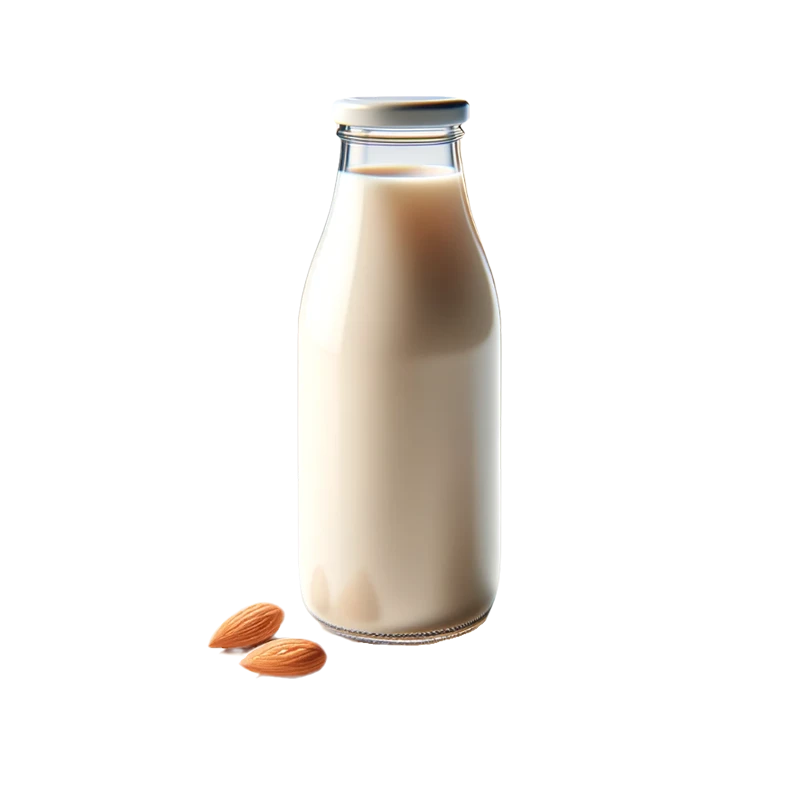Almond Milk — Nutrients, Health Benefits, And Shopping Tips

Written by Listonic Team
Last update on September 4, 2024
Nutrients
Nutrition facts
Amount per 100 g
Calories
🔥 17 kcal
| Nutrition per: 100 g | Value | % Daily Value* |
|---|---|---|
| Carbs | 0 g | - |
| Fiber | 0 g | - |
| Sugars | 0 g | - |
| Glycemic Index | 30 | - |
| Protein | 1 g | 2% |
| Sodium | 50 mg | 2.17% |
| Total Fat | 2 g | 2.56% |
*The % of Daily Value (DV) tells you how much a nutrient in a serving of food contributes to a daily diet. 2,000 calories a day is used for general nutrition advice.
17
🍏 Low-Calorie Foods
30
🟢 Low Glycemic Index
Key takeaways
Health benefits
- Low in calories, making it a great choice for weight management and reducing calorie intake.
- Supports heart health with its low saturated fat content and high levels of healthy fats, which can help maintain healthy cholesterol levels.
- Rich in vitamins and minerals such as Vitamin E, which is important for skin health, and calcium for bone health (when fortified).
- Suitable for lactose intolerance, providing a nutritious alternative to cow's milk for those who are lactose intolerant.
Health risks
- Possible nut allergies as almond milk can trigger allergic reactions in people with tree nut allergies, causing symptoms like hives, swelling, and anaphylaxis.
- Low protein content compared to cow’s milk, which may not be suitable for those needing higher protein intake, especially children and athletes.
- Added sugars in flavored or sweetened almond milk, contributing to increased caloric intake and potential weight gain.
- Calcium absorption issues, as some almond milks may contain compounds that inhibit the absorption of calcium, affecting bone health.
How to choose almond milk
Select almond milk that has a creamy texture and a naturally light beige color, ensuring it lists almonds as the first or second ingredient—this suggests a richer, more authentic flavor. Make sure the product is well within its expiration date to guarantee freshness.
Avoid almond milk that has added sugars or excessive stabilizers, as these can alter the natural taste and diminish nutritional benefits. Almond milk that shows signs of separation when shaken should also be avoided, as it indicates poor quality.

How to store almond milk
Proper storage of almond milk involves keeping it in the refrigerator at a temperature below 40°F (4°C). Make sure it is tightly sealed to maintain freshness and prevent contamination. Once opened, consume almond milk within 7-10 days for the best quality.
Leaving almond milk out at room temperature for extended periods can cause it to spoil quickly. Freezing almond milk is not recommended unless it is for cooking or baking purposes, as freezing can alter its texture and taste. Additionally, avoid storing it in the refrigerator door, where temperatures fluctuate more, which can cause it to spoil faster.
✅ Extra Tip
How long does it last?
Almond milk's shelf life depends on whether it's store-bought or homemade. Unopened store-bought almond milk can last for 7-10 days past the printed expiration date when stored in the refrigerator. Once opened, it should be consumed within 7-10 days. Homemade almond milk has a shorter shelf life, typically lasting 3-5 days in the refrigerator. Proper storage, such as keeping it in a tightly sealed container and always refrigerating after opening, is essential to maximize its freshness and prevent spoilage.
What to do with leftovers?
Leftover almond milk is versatile and can be used in a variety of dishes. Add it to smoothies for a creamy texture or use it as a base for dairy-free soups and sauces. It's a great substitute for regular milk in baking recipes like pancakes, muffins, or bread, where it imparts a subtle nutty flavor.
Use almond milk in your morning oatmeal or as a dairy-free creamer in coffee and tea. You can also blend it into homemade ice cream or puddings for a vegan-friendly dessert. If you have a large amount left over, consider making a batch of dairy-free mashed potatoes or creamy pasta sauce. Almond milk can also be frozen in ice cube trays to use later in smoothies or to chill coffee without watering it down.
👨⚕️️ Medical disclaimer
Discover products from other categories
Listonic Team
Fact-checked
Our editorial team checked this article to make sure it was accurate at the time of publishing it.
Get the top-rated shopping list app

almond milk
1 piece







